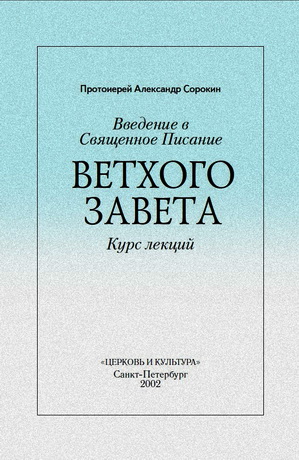
Cambridge Companions - Religious Texts and Their Interpretation
Many think critically of historical criticism. Fewer think historically about historical criticism. Though now taken for granted as the foundation of modern biblical studies, reading texts with an eye to their own history once threw Europe into panic. In 1795, the German philologist Friedrich August Wolf argued the great Homeric works were neither unified works nor by one man named Homer. The implications were clear to poet Elizabeth Barrett Browning, who penned,
. . . Wolff’s an atheist;
And if the Iliad fell out, as he says,
By mere fortuitous concourse of old songs,
We’d guess as much, too, for the universe.
Philology could have grave consequences for theology. So deep was the connection between biblical and classical learning, so taut the tie of ancient and modern worlds, so high the religious and political stakes, that challenging the unity of Homer the Greek, pagan Homer could be called an “Antichristian conspiracy” and likened to “a perverse attempt at explaining the world without a god.” If the apparent foundations of Western civilization crumbled, so too would the structures that rested upon them.
But the glories of ancient Greece were far from the only ones to fall and to put both church and crown at risk of doing so as well. Wolf’s approach was lupine, devouring all the textual piggies in its path. An ascendant mythological reading consumed ancient writings all the more. Barthold Georg Niebuhr found unbelievable legends in the historical accounts of early Roman writers in his Römische Geschichte (History of Rome, 1811 12), leading the Oxford bishop Samuel Wilberforce to ask, “whether the human mind, which with Niebuhr has tasted blood in the slaughter of Livy, can be prevailed upon to abstain from falling next upon the Bible.” The human mind could not. If Wilhelm Martin Leberecht de Wette looked to smaller units of tradition within the Old Testament literature, David Friedrich Strauss, with Das Leben Jesu (The Life of Jesus, 1835), dissected the Gospels into a collection of disparate stories. In Prolegomena zur Geschichte Israels (Prolegomena to the History of Israel, 1883), an echo of Wolf’s own Prolegomena ad Homerum (Prolegomena to Homer), Julius Wellhausen later judged Moses less a creator of than character in the Hebrew Bible. As one contemporary observed: “When scientific historical criticism reduced the annals of heroic Greece and of regal Rome to the level of fables; when the unity of authorship of the Iliad was successfully assailed by scientific literary criticism . . . it needed no prophetic gift to see that, sooner or later, the Jewish and the early Christian records would be treated in the same manner.” While medieval heroes were being raised in the nineteenth century Arthur in England, Roland in France, Maerlant in Flanders, El Cid in Spain ancient ones were being razed: Homer, Livy, Moses, Jesus. It was Kritik that toppled them.
The New Cambridge Companion to Biblical Interpretation
Edited by Ian Boxall and Bradley C. Gregory, 2022
- Introduction. Ian Boxall, Bradley C. Gregory
Part I - Methods
- 1 - A Historical, Critical Retrospective on Historical Criticism. Paul Michael Kurtz
- 2 - Historical Criticism: Methods. Shively T. J. Smith
- 3 - Philosophical Hermeneutics. Craig G. Bartholomew
- 4 - Literary Criticism. Francisco Lozada
- 5 - Rhetorical Criticism. Greg Carey
- 6 – Intertextuality. Stefan Alkier
- 7 - Social-Scientific Criticism. Philip F. Esler
Part II - Frameworks/Stances
- 8 - Jewish Interpretation. Karin Hedner Zetterholm
- 9 - Christian Theological Interpretation. Stephen Fowl
- 10 - Liberationist Interpretation. Gerald O. West
- 11 - Postcolonial Interpretation. Jin Young Choi
- 12 - Feminist Interpretation. Mary Ann Beavis
- 13 - LGBTI/Queer Interpretation. Ken Stone
- 14 - Ecological Interpretation. Deryn Guest
Part III - Reception
- 15 - The Relevance of Textual Criticism for Biblical Interpretation. Bradley C. Gregory
- 16 - Premodern Interpretation and Contemporary Exegesis. Richard S. Briggs
- 17 - The Bible and Literature. Alison Jack
- 18 - The Bible and Visual Exegesis. Ben Quash
- 19 - Uses of the Bible in Communities of Faith. Ian Boxall
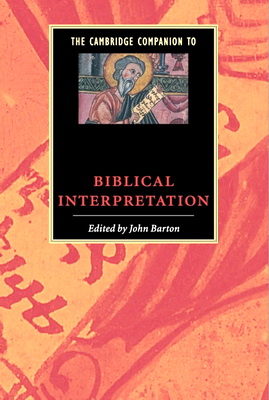
The Cambridge Companion to Biblical Interpretation
Edited by John Barton, 1998
- Introduction. John Barton
Part 1 - Lines of approach
- 1 - Historical-critical approaches. John Barton
- 2 - Literary readings of the Bible. David Jasper
- 3 - The social world of the Bible. Keith W. Whitelam
- 4 - Poststructuralist approaches New Historicism and postmodernism. Robert P. Carroll
- 5 - Political readings of Scripture. Tim Gorringe
- 6 - Feminist interpretation. Ann Loades
- 7 - Biblical studies and theoretical hermeneutics. Anthony Thiselton
- 8 - The Bible and Christian theology. Robert Morgan
- 9 - Biblical study and linguistics. William Johnstone
- 10 - Aspects of the Jewish contribution to biblical interpretation. Stefan C. Reif
- 11 - The Bible in literature and art. Stephen Prickett
Part 2 - Biblical books in modern interpretation
- 12 - The Pentateuch. Joseph Blenkinsopp
- 13 - The historical books of the Old Testament. Iain Provan
- 14 - The prophetic books. Robert R. Wilson
- 15 - The poetic and wisdom books. Robert Alter
- 16 - The Synoptic Gospels and Acts of the Apostles Telling the Christian story. Pheme Perkins
- 17 - John and the Johannine literature The woman at the well. John Ashton
- 18 - The Pauline Letters. James Dunn
- 19 - The non-Pauline Letters. Frances Young
- 20 - Apocalyptic literature. James C. Vanderkam
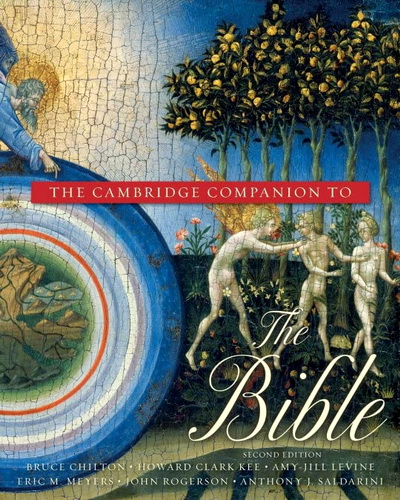
The Cambridge Companion to the Bible
2nd edition, edited by Bruce Chilton, 2008
Introduction. Howard Clark Kee
- I. Preface
- II. Purpose
- III. The concept of God’s People
- Bibliographical Essay
Part One: The World of the Hebrew Bible. Eric M. Meyers and John Rogerson
- I. The World of Israel’s Ancestors
- II. The World of Israel’s "Historians"
- III. The World of Israel’s Prophets
- IV. The World of Israel’s Worship
- V. The World of Israel’s Sages and Poets
- VI. The World of Apocalyptic
- Bibliographical and Biographical Essay
Part Two: Jewish Responses to Greek and Roman Cultures, 322B.C.E. to 200C.E. Anthony J. Saldarini as revised by Amy-Jill Levine
- I. Preservation and Adaptation: The Encounter with Hellenism
- II. Antiochus IV and the Maccabean Crisis
- III. Roman Invasion and Jewish Response
- IV. Herod the Great
- V. Herod’s Heirs
- VI. Roman Rule in the First Century C.E.
- VII. Mid-First-Century C.E. Crises
- VIII. The Jewish World after the Fall of Jerusalem
- Bibliographical Essay
Part Three: The Formation of Christian Communities. Howard Clark Kee
- I. Jesus and the Covenant
- II. Paul: The Jesus Movement in the Roman World
- III. Christianity Responds to Formative Judaism
- IV. Christianity Responds to Roman Culture and Imperial Policy
- V. Diversity in the Church
- VI. Attempts to Unify Faith and Practice
- Bibliographical Essay
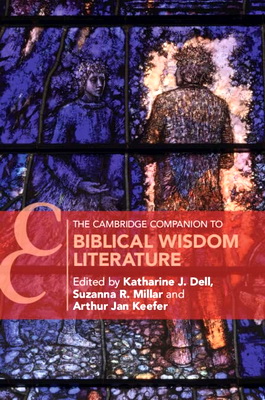
The Cambridge Companion to Biblical Wisdom Literature
Edited by Katharine J. Dell, Suzanna R. Millar, and Arthur Jan Keefer, 2022
Part I - The Context of Wisdom Literature
- 1 – Introduction. Katharine J. Dell, Suzanna R. Millar, Arthur Jan Keefer
- 2 - The Scope of Wisdom Literature. Tremper Longman
- 3 - The Multiple Genres of Wisdom. Suzanna R. Millar
- 4 - The Literary Context(s) and Development of Wisdom Literature in Ancient Israel (with Special Reference to Proverbs). Knut M. Heim
- 5 - The Scribal World. Mark Sneed
- 6 - Theological Themes in the ‘Wisdom Literature’: Proverbs, Job and Ecclesiastes. Katharine J. Dell
- 7 - The Solomonic Connection: Solomon and Wisdom in Kings and Chronicles. David Firth
Part II - Wisdom Literature in the Hebrew Bible
- 8 – Proverbs. Christopher B. Ansberry
- 9 – Job. Will Kynes
- 10 – Ecclesiastes. Mette Bundvad
- 11 - The Song of Songs. Jennifer L. Andruska
- 12 - Wisdom Psalms. Simon Chi-chung Cheung
- 13 - Wisdom’s Wider Resonance. Michael C. Legaspi
Part III - Wisdom Literature beyond the Hebrew Bible
- 14 - Ben Sira. Seth A. Bledsoe
- 15 - The Book of Wisdom. Joachim Schaper
- 16 - Wisdom at Qumran. David A. Skelton
- 17 - Egyptian Wisdom. Michael V. Fox, Suzanna R. Millar
- 18 - The Syro-Palestinian Wisdom of the Late Bronze Age. Noga Ayali-Darshan
- 19 - Mesopotamian Wisdom. Paul-Alain Beaulieu
Part IV - Themes in the Wisdom Literature
- 20 - Creation in the Wisdom Literature. Zoltán Schwáb
- 21 - Reward and Retribution. Peter T. H. Hatton
- 22 - From Rebuke to Testimony to Proverb: Wisdom’s Many Pedagogies. William P. Brown
- 23 - The Wisdom Literature and Virtue Ethics. Arthur Jan Keefer
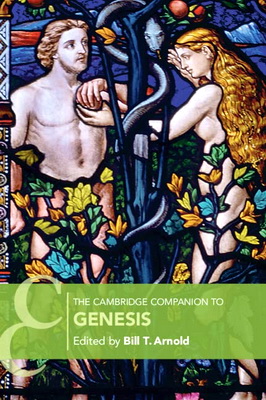
The Cambridge Companion to Genesis
Edited by Bill T. Arnold, 2022
- 1. Introduction: Genesis and the status quaestionis. BILL T. ARNOLD
Part I: Composition and Structure of Genesis
- 2. Genesis in the History of Critical Scholarship. JEAN-LOUIS SKA
- 3. Genesis in Source and Redaction Criticism Today. JAN CHRISTIAN GERTZ
- 4. Genesis in Form and Tradition Criticism Today. CHRISTOPH LEVIN
- 5. Rhetorical Features and Characteristics: The Literary Function of Genealogies, Itineraries, and Other Etiologies in the Book of Genesis. MICHAELA BAUKS
Part II: Social World of Genesis
- 6. Genesis and Its Ancient Literary Analogues. ALICE MANDELL
- 7. Genesis and the Conceptual World of the Ancient Near East. JOHN H. WALTON
- 8. Family, Clan, and Tribe in the Book of Genesis. NAOMI A. STEINBERG
- 9. Women ’ s Status and Feminist Readings of Genesis. SARAH SHECTMAN
Part III: Themes and Literary Motifs of Genesis
- 10. From Imago to Imagines : The Image(s) of God in Genesis. BRENT A. STRAWN
- 11. Genesis, Science, and Theories of Origins. JITSE M. VAN DER MEER
- 12. Genesis and Ethics. ECKART OTTO
- 13. Genesis and the Problem of Evil: Philosophical Musings on the Bible ’ s First Book. PAUL M. GOULD
Part IV: Reception History of Genesis
- 14. Modern Philosophical Receptions of Genesis. FREDERICK D. AQUINO
- 15. Jewish Reflections on Universalism and Particularism in Genesis. JOEL S. KAMINSKY
- 16. Before Moses: Genesis among the Christians. IAIN PROVAN
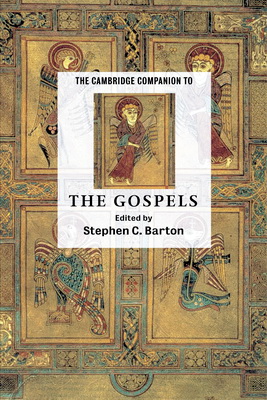
The Cambridge Companion to the Gospels
Edited by Stephen C. Barton, 2006
- Introduction. Stephen C. Barton
Part I - Approaching the gospels: context and method
- 1 - What is a gospel? Loveday Alexander
- 2 - The fourfold gospel. Francis Watson
- 3 - The canonical matrix of the gospels. Richard B. Hays
- 4 - The gospels and ‘the historical Jesus’. Stephen E. Fowl
- 5 - The gospels and the reader. Sandra M. Schneiders
Part II - The gospels as witnesses to Christ: content and interpretation
- 6 - The Gospel according to Matthew. Stephen C. Barton
- 7 - The Gospel according to Mark. Joel B. Green
- 8 - The Gospel according to Luke. John T. Squires
- 9 - The Gospel according to John. Marianne Meye Thompson
Part III - The afterlife of the gospels: impact on church and society
- 10 - The gospels and the development of doctrine. Frances Young
- 11 - The gospels embodied: the lives of saints and martyrs. David Matzko McCarthy
- 12 - Praying the gospels: spirituality and worship. Gordon Mursell
- 13 - Living the gospels: morality and politics. Scott Bader-Saye
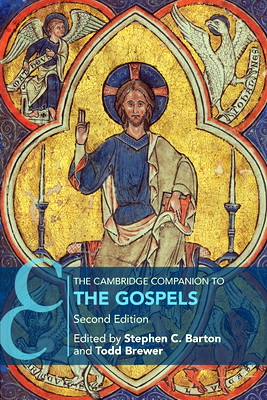
The Cambridge Companion to the Gospels
2nd Edition, edited by Stephen C. Barton and Todd Brewer, 2021
- Introduction. STEPHEN C. BARTON AND TODD BREWER
Part I. Approaching the Gospels: Context and Method
- 1. What Is a Gospel? LOVEDAY ALEXANDER
- 2. The Fourfold Gospel. FRANCIS WATSON
- 3. Gospel Sources and Interrelations. TODD BREWER
- 4. The Scriptural Matrix of the Gospels. RICHARD B. HAYS AND CHRISTOPHER BLUMHOFER
- 5. The Gospels and ‘ the Historical Jesus ’. STEPHEN E. FOWL
- 6. The Gospels and the Reader. SANDRA M. SCHNEIDERS
Part II. The Gospels As Witnesses to Christ: Content and Interpretation
- 7. The Gospel according to Matthew. ROLAND DEINES
- 8. The Gospel according to Mark. ELIZABETH E. SHIVELY
- 9. The Gospel according to Luke. JOHN T. SQUIRES
- 10. The Gospel according to John. CHRISTOPHER W. SKINNER
- 11. Non-canonical Gospels as Witnesses to Christ. SIMON GATHERCOLE
- 12. God and the Knowledge of God in the Gospels. STEPHEN C. BARTON
Part III. The Afterlife of the Gospels: Impact on Church and Society
- 13. The Gospels and Doctrine. FRANCES YOUNG
- 14. Reception History of the Gospels. CHRISTINE E. JOYNES
- 15. Praying the Gospels: Spirituality and Worship. GORDON MURSELL
- 16. The Gospels Embodied: The Lives of Saints and Martyrs. DAVID MATZKO MCCARTHY
- 17. Living the Gospels: Morality and Politics. SCOTT BADER-SAYE
- 18. The Gospels for the Life of the World. BEN QUASH
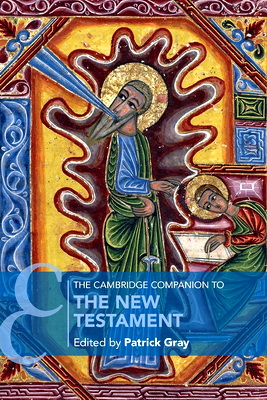
The Cambridge Companion to the New Testament
Edited by Patrick Gray, 2021
Part I - Historical Context
- 1 - The Social and Political Milieu. Helen K. Bond
- 2 - The Religious and Philosophical Milieu. John T. Fitzgerald
- 3 - The Historical Jesus. Sarah E. Rollens, Anthony Le Donne
- 4 - The Life and Letters of Paul. Margaret M. Mitchell
Part II - The New Testament Writings
- 5 - The Gospel of Mark. Michael F. Bird
- 6 - The Gospel of Matthew. Paul Foster
- 7 - The Third Gospel and the Acts of the Apostles. Mikeal C. Parsons
- 8 - The Gospel of John. George Parsenios
- 9 - 1–2 Thessalonians. Nijay K. Gupta
- 10 - 1–2 Corinthians. Alexandra R. Brown
- 11 - Romans and Galatians. Matthew V. Novenson
- 12 - The Prison Epistles. Jerry Sumney
- 13 - Letters to Paul’s Associates (1–2 Timothy, Titus). Benjamin L. White
- 14 - The Letter to the Hebrews. David M. Moffitt
- 15 - The General Epistles. Patrick J. Hartin
- 16 – Revelation. Leslie Baynes
Part III - Methods and Modes of Interpretation
- 17 - The Canon of the New Testament. Julia Snyder
- 18 - Historical-Critical Methods. James W. Barker
- 19 - Literary Approaches. Elizabeth E. Shively
- 20 - Social Sciences, Social History, and Ideology. James Crossley
- 21 - The New Testament and Theology. Kevin J. Vanhoozer
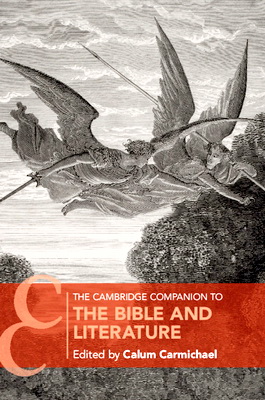
The Cambridge Companion to the Bible and Literature
Edited by Calum Carmichael, 2020
- 1. Literature in the Ancient Near East and the Bible. STEVE A. WIGGINS
- 2. The Primary Narrative (Genesis through 2 Kings). THOMAS L. BRODIE
- 3. Reading Biblical Literature from a Legal and Political Perspective. GEOFFREY P. MILLER
- 4. Biblical Law and Literature. CALUM CARMICHAEL
- 5. Kings, Prophets, and Judges. GRAEME AULD
- 6. Prophetic Literature. VICTOR H. MATTHEWS
- 7. Wisdom Literature. JAMES CRENSHAW
- 8. The Gospels. JEANNINE K. BROWN
- 9. Paul’s Letters. TODD D. STILL
- 10. Apocalyptic Literature. MEGHAN HENNING
- 11. Shakespeare’s King Lear and the Bible. WILLIAM J. KENNEDY
- 12. The Bible and John Milton’s Paradise Lost. GORDON TESKEY
- 13. The Bible, Shelley, and English Romanticism. JONATHAN FORTIER
- 14. Herman Melville and the Bible. RUTH BLAIR
- 15. The Song of Songs and Two Biblical Retellings. EMILY O. GRAVETT
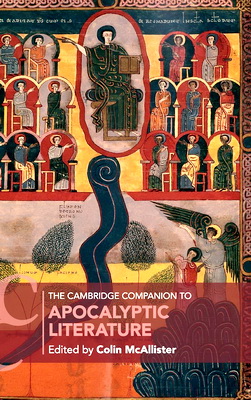
The Cambridge Companion to Apocalyptic Literature
Edited Ьу Colin McAllister, 2020
- 1 - Through a Glass Darkly: Time, the End, and the Essence of Apocalyptica. Colin McAllister
- 2 - Apocalypticism as a Worldview in Ancient Judaism and Christianity. John J. Collins
- 3 - Introduction to the Book of Revelation. Ian Paul
- 4 - The Gnostic Apocalypses. Dylan M. Burns
- 5 - Exegeting the Apocalypse with the Donatist Communion. Jesse A. Hoover
- 6 - Tests of Faith, Rebirth out of Corruption, or Endless Cycles of Regeneration: Experiments in the Restoration of the Late Roman Empire. Brian Duvick
- 7 - Latin Reception of the Apocalypse in the Early Middle Ages. E. Ann Matter
- 8 - Exegesis of the Apocalypse in the Tenth Century. Francis X. Gumerlock
- 9 - The End of the World at the Ends of the Earth: Apocalyptic Thought in Medieval Ireland. John Carey
- 10 - Byzantine Apocalyptic Literature. András Kraft
- 11 - Joachim of Fiore and the Apocalyptic Revival of the Twelfth Century. Brett Edward Whalen
- 12 - Apocalyptic Sensibility in Renaissance Europe. Ian Boxall
- 13 - “Pride & Vanity of the Imagination, That Disdains to Follow This World’s Fashion”: Apocalypticism in the Age of Reason. Christopher Rowland
- 14 - The Formation of Antichrist in Medieval Western Christian Thought. Kevin L. Hughes
- 15 - From Dabiq to Jerusalem: Trajectories of Contemporary Salafi-jihadi Apocalypticism. David Cook
- 16 - American Evangelicals and the Apocalypse. Daniel G. Hummel
- 17 - Apocalypticism in the Contemporary World. Lorenzo DiTommaso
- Appendix: Early Medieval Commentaries on the Apocalypse
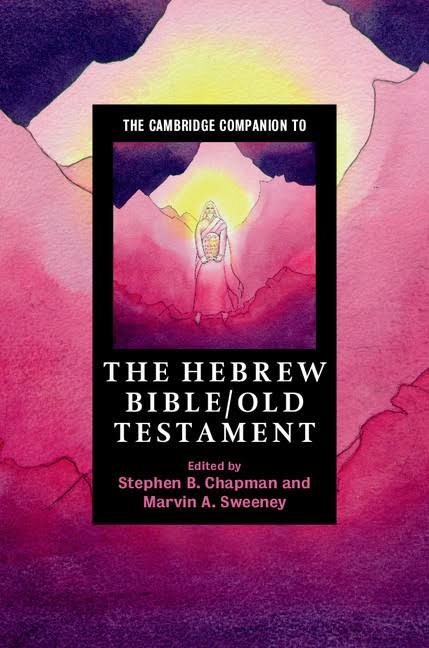
The Cambridge Companion to the Hebrew Bible/Old Testament
Edited by Stephen B. Chapman and Marvin A. Sweeney, 2016
- Introduction. Stephen B. Chapman and Marvin A. Sweeney
Part I. Text and canon
- 1. Texts, titles, and translations. James C. VanderKam
- 2. Collections, canons, and communities. Stephen B. Chapman
Part II. Historical background
- 3. The ancient Near Eastern context. Kenton L. Sparks
- 4. The history of Israelite religion. Brent A. Strawn
- 5. The Hebrew Bible and history. Marc Zvi Brettler
Part III. Methods and approaches
- 6. Historical-critical methods. John J. Collins
- 7. Social science models. Victor H. Matthews
- 8. Literary approaches to the Hebrew Bible. Adele Berlin
Part IV. Subcollections and genres
- 9. The Pentateuch and Israelite law. Thomas B. Dozeman
- 10. The Former Prophets and historiography. Richard D. Nelson
- 11. The Latter Prophets and prophecy. Marvin A. Sweeney
- 12. The Psalms and Hebrew poetry. William P. Brown
- 13. Wisdom. Samuel E. Balentine
- 14. Late historical books and rewritten history. Ehud Ben Zvi
- 15. The biblical short story. Lawrence M. Wills
- 16. Apocalyptic writings. Stephen L. Cook
- 17. Deuterocanonical/apocryphal books. Sharon Pace
Part V. Reception and use
- 18. The Hebrew Bible in Judaism. Frederick E. Greenspahn
- 19. The Old Testament in Christianity. R. W. L. Moberly
- 20. The Hebrew Bible in Islam. Walid A. Saleh
- 21. The Hebrew Bible in art and literature. David Lyle Jeffrey
- 22. The Old Testament in public: the Ten Commandments, evolution, and Sabbath closing laws. Nancy J. Duff
- 23. The Theology of the Hebrew Bible/Old Testament. John Goldingay
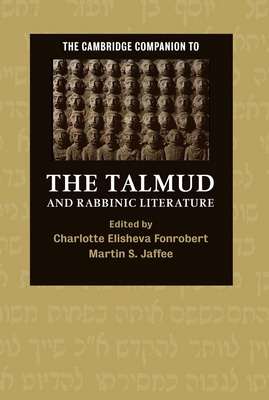
The Cambridge Companion to the Talmud and Rabbinic Literature
Edited by Charlotte Elisheva Fonrobert and Martin S. Jaffee, 2007
- Introduction: The Talmud, Rabbinic Literature, and Jewish Culture. Charlotte Elisheve Fonrobert, Martin S. Jaffee
Part I: - The Conditions of Rabbinic Literary Activity
- 1 - Rabbinic Authorship as a Collective Enterprise. Martin S. Jaffee
- 2 - The Orality of Rabbinic Writing. Elizabeth Shanks Alexander
- 3 - Social and Institutional Settings of Rabbinic Literature. Jeffrey L. Rubenstein
- 4 - The Political Geography of Rabbinic Texts. Seth Schwartz
Part II: - The Genres of Rabbinic Literary Composition
- 5 - Rabbinic Midrash and Ancient Jewish Biblical Interpretation. Steven D. Fraade
- 6 - The Judaean Legal Tradition and the Halakhah of the Mishnah. Shaye J. D. Cohen
- 7 - Roman Law and Rabbinic Legal Composition. Catherine Hezser
- 8 - Middle Persian Culture and Babylonian Sages: Accommodation and Resistance in the Shaping of Rabbinic Legal Tradition. Yaakov Elman
- 9 - Jewish Visionary Tradition in Rabbinic Literature. Michael D. Swartz
- 10 - An Almost Invisible Presence: Multilingual Puns in Rabbinic Literature. Galit Hasan-Rokem
Part III: - Hermeneutical Frames for Interpreting Rabbinic Literature
- 11 - The “Other” in Rabbinic Literature. Christine Hayes
- 12 - Regulating the Human Body: Rabbinic Legal Discourse and the Making of Jewish Gender. Charlotte Elisheva Fonrobert
- 13 - Rabbinic Historiography and Representations of the Past. Isaiah Gafni
- 14 - Rabbinical Ethical Formation and the Formation of Rabbinic Ethical Compilations. Jonathan Wyn Schofer
- 15 - Hellenism in Jewish Babylonia. Daniel Boyarin
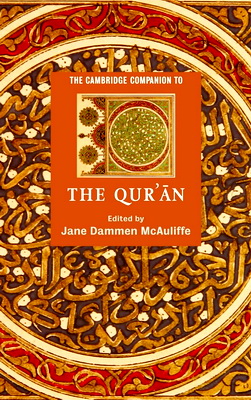
The Cambridge Companion to the Qur'ān
Edited by Jane Dammen McAuliffe, 2007
- Introduction. Jane Dammen McAuliffe
Part I - Formation of the Qur'ānic text
- 1 - The historical context. Fred M. Donner
- 2 - Creation of a fixed text. Claude Gilliot
- 3 - Alternative accounts of the Qur'ān’s formation. Harald Motzki
Part II - Description and analysis
- 4 - Themes and topics. Daniel A. Madigan
- 5 - Structural, linguistic and literary features. Angelika Neuwirth
- 6 - Recitation and aesthetic reception. William A. Graham, Navid Kermani
Part III - Transmission and dissemination
- 7 - From palm leaves to the Internet. Fred Leemhuis
- 8 - Inscriptions in art and architecture. Sheila Blair, Jonathan Bloom
Part IV - Interpretations and intellectual traditions
- 9 - The tasks and traditions of interpretation. Jane Dammen McAuliffe
- 10 - Multiple areas of influence. Alexander Knysh
- 11 - Western scholarship and the Qur'ān. Andrew Rippin
Part V - Contemporary readings
- 12 - Women’s readings of the Qur'ān. Asma Barlas
- 13 - Political interpretation of the Qur'ān. Stefan Wild
- 14 - The Qur'ān and other religions. Abdulaziz Sachedina
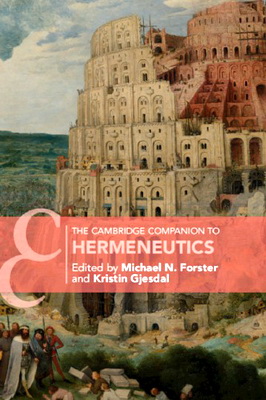
The Cambridge Companion to Hermeneutics
Edited by Michael N. Forster and Kristin Gjesdal, 2018
- 1. Hermeneutics and Theology. Christoph Bultmann
- 2. Hermeneutics and Nature. Dalia Nassar
- 3. Hermeneutics and Romanticism. Fred Rush
- 4. Hermeneutics and German Idealism. Paul Redding
- 5. Hermeneutics and History. John H. Zammito
- 6. Hermeneutics and Positivism. Frederick C. Beiser
- 7. Hermeneutics: Nietzschean Approaches. Paul Katsafanas
- 8. Hermeneutics and Psychoanalysis. Sebastian Gardner
- 9. Hermeneutics and Phenomenology. Benjamin Crowe
- 10. Hermeneutics and Critical Theory. Georgia Warnke
- 11. Hermeneutics: Francophone Approaches. Michael N. Forster
- 12. Hermeneutics: Non- Western Approaches. Kai Marchal
- 13. Hermeneutics and Literature. Jonathan Culler
- 14. Hermeneutics and Law. Ralf Poscher
- 15. Hermeneutics and the Human Sciences. Kristin Gjesdal
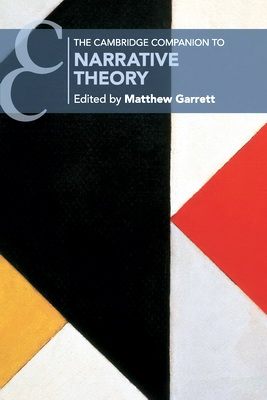
The Cambridge Companion to Narrative Theory
Edited by Matthew Garrett, 2018
- Introduction. Matthew Garrett
Part I - Foundations
- 1 - Narrative Theory’s Longue Durée. Kent Puckett
- 2 - Questions of Scale: Narrative Theory and Literary History. Yoon Sun Lee
- 3 - The Body of Plot: Viktor Shklovsky’s Theory of Narrative. Ilya Kalinin
- 4 - Adventures in Structuralism: Reading with Barthes and Genette. Hannah Freed-Thall
- 5 - The Feminist Foundations of Narrative Theory. Judith Roof
- 6 - Philosophies of History. Matthew Garrett
Part II - Motifs
- 7 – Character. John Frow
- 8 – Time. David Wittenberg
- 9 – Pleasure. David Kurnick
Part III - Coordinates
- 10 - Breaks, Borders, Utopia: Race and Critical Narrative Poetics. Amy C. Tang
- 11 - Queer Narrative Theory. Valerie Rohy
- 12 - Screenarration: The Plane and Place of the Image. Garrett Stewart
- 13 - Narrative Theory and the Lyric. Jonathan Culler
- 14 - Contemporary Formalisms. Mark Currie
- 15 - Digital Games and Narrative. Patrick Jagoda
- 16 - Narrative Theory and Novel Theory. Margaret Cohen
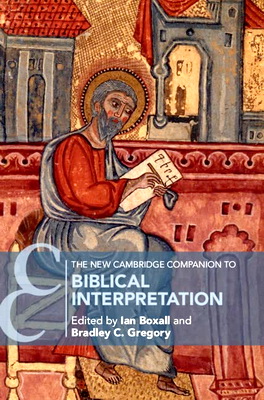
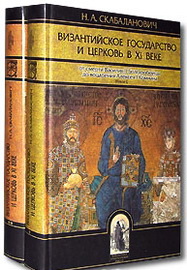
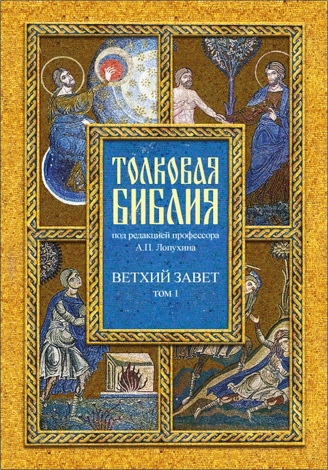
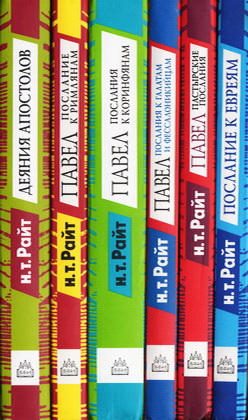
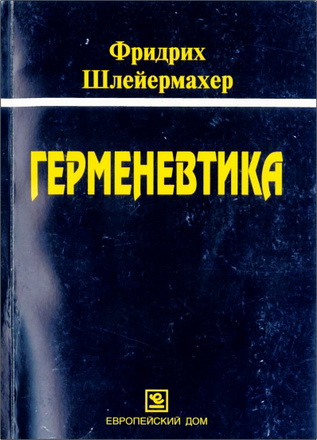
Комментарии (3 комментария)
PDF Hermeneutics - 29/12/2022 ссылка неверная
Странно, у меня работает и дает скачать этот файл
Бесценные пособия по библеистике, поистине царский подарок для студентов и преподавателей!